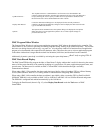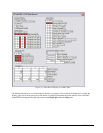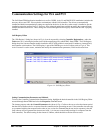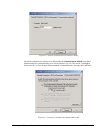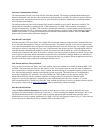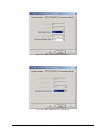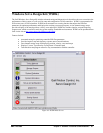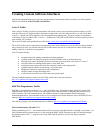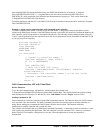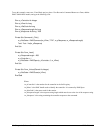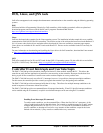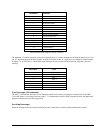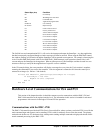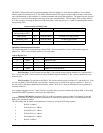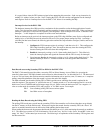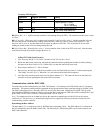
DMC-1700/1800 Chapter 4 - Software Tools and Communications • 63
After installing DMCWin into the default directory, the DMCCOM.H header file is located in C:\Program
Files\Galil\DMCWIN\INCLUDE. C++ programs that use the class library need the files DMCWIN.H and
DMCWIN.CPP, which contain the class definitions and implementations respectively. These can be found in the
C:\ProgramFiles\Galil\DMCWIN\CPP directory.
To link the application with the DLL’s, the DMC32.lib file must be included in the project and is located at C:\Program
Files\Galil\DMCWIN\LIB
Example: A simple console application that sends commands to the controller
To initiate communication, declare a variable of type HANDLEDMC (a long integer) and pass the address of that
variable in the DMCOpen() function. If the DMCOpen() function is successful, the variable will contain the handle to the
Galil controller, which is required for all subsequent function calls. The following simple example program written as a
Visual C console application tells the controller to move the X axis 1000 encoder counts. Remember to add DMC32.LIB
to your project prior to compiling.
#include <windows.h>
#include <dmccom.h>
long lRetCode;
HANDLEDMC hDmc;
HWND hWnd;
int main(void)
{
// Connect to controller number 1
lRetCode= DMCOpen(1, hWnd, &hDmc);
if (rc == DMCNOERROR)
{
char szBuffer[64];
// Move the X axis 1000 counts
lRetCode = DMCCommand(hDmc, "PR1000;BGX;", szBuffer,
sizeof(szBuffer));
// Disconnect from controller number 1 as the last action
lRetCode = DMCClose(hDmc);
}
return 0;
}
Galil Communications API with Visual Basic
Declare Functions
To use the Galil communications API functions, add the module file included in the
C:\ProgramFiles\Galil\DMCWIN\VB directory named DMCCOM40.BAS. This module declares the routines making
them available for the VB project. To add this file, select ‘Add Module’ from the ‘Project’ menu in VB5/6.
Sending Commands in VB
Most commands are sent to the controller with the DMCCommand() function. This function allows any Galil command
to be sent from VB to the controller. The DMCCommand() function will return the response from the controller as a
string. Before sending any commands the DMCCOpen() function must be called. This function establishes
communication with the controller and is called only once.
This example code illustrates the use of DMCOpen() and DMCCommand(). A connection is made to controller #1 in the
Galil registry upon launching the application. Then, the controller is sent the command ‘TPX’ whenever a command
button is pressed. The response is then placed in a text box. When the application is closed, the controller is
disconnected.



